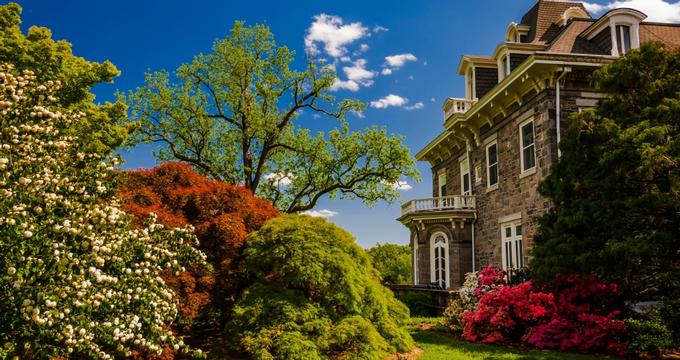For a peaceful escape into nature right in the heart of Baltimore, the Cylburn Arboretum offers a perfect blend of history, horticulture, and hiking. Centered around the grand 19th-century Cylburn Mansion, the arboretum spans 207 acres of beautifully maintained gardens, woodland trails, and historic landscapes. It’s a wonderful place for plant lovers, birders, families, and anyone seeking a quiet moment in nature.
Recommended for
- Garden enthusiasts and botany lovers
- Families with young explorers
- Nature photographers and birdwatchers
- Locals and visitors looking for serene trails and open spaces
Gardens to Explore
- South Gardens: Memorial plantings and a colorful azalea garden in front of the mansion
- West Gardens: Includes a demonstration vegetable garden and composting site
- North Gardens: Features small city-style gardens and a shady garden retreat
- East Gardens: Home to the Garden of the Senses, a formal garden, and a tree peony collection
- Other highlights include dahlia, heritage rose, and daylily gardens
Notable Trees & Plant Collections
- Historic trees dating back to the 1800s, including a Japanese maple grove
- A beautiful collection of conifers, flowering magnolias, weeping cherry trees, hollies, and more
Trails & Outdoor Activities
- Explore 3.5 miles of trails through woods and native habitats
- A haven for wildflowers, birds, and wildlife
- Trails are great for hiking and dog walking (bikes permitted on paved paths)
- The historic Cylburn Mansion is open for self-guided visits during limited hours
History & Architecture
- The Cylburn Mansion was built in 1868 by Jesse Tyson, a prominent industrialist
- Designed in the Victorian Renaissance Revival style using local stone and ornate details
- Used as a summer home, later an orphanage, and became a public park in 1954
- Renamed an arboretum in 1982 to highlight its plant collections and conservation work
- The Vollmer Visitor Center and education facilities were added between 2008–2010
Education & Community Programs
- Join birding walks, yoga classes, and gardening workshops
- Kids can participate in Summer Nature Camps focused on ecology and science
- Submit your wildlife photos as part of an ongoing documentation effort
- Visit the Food Systems Lab, developed with Johns Hopkins, to learn about sustainable growing practices and aquaponics
Current Exhibits
- The Vollmer Visitor Center regularly hosts local artists and rotating exhibits
- Currently showcasing paintings by award-winning Baltimore artist Kathleen Kotarba
- Admission to the exhibits and gardens is free; open year-round except major holidays
Location & Contact
- Address: 4915 Greenspring Avenue, Baltimore, MD 21209
- Phone: 410-367-2217
Plan Your Trip


